Gambling education programme aims to shatter stigma
- Published
Pete Keogh: "I'm hopeful we are going to provide something that will save lives."
"He should be there - and he's not."
The sense of grief, and disbelief, is obvious when Pete and Sadie Keogh speak about their son Lewis.
He was popular, outgoing and a passionate sportsperson.
But he kept his addiction to gambling a secret.
When he was 34, he took his own life.
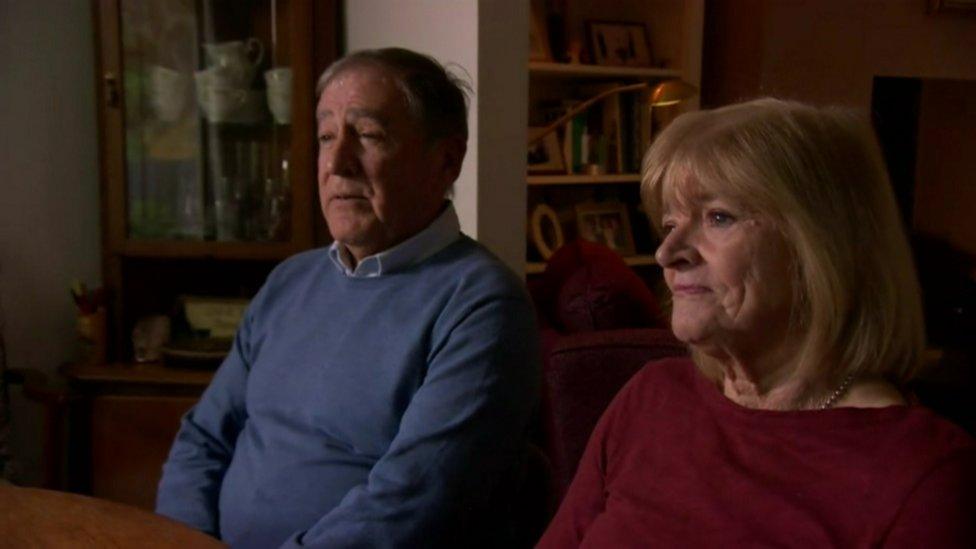
Pete and Sadie Keogh say their son hid his addiction from everyone
At their home in Enniskillen, in County Fermanagh, Pete and Sadie Keogh leaf through the photo album which was put together by his friends and football teammates in Leeds, where he had settled to work.
"No-one knew how much he was suffering," Sadie said.
"He completely hid it from everybody.
"You never get over it. It's the same eight years on as it was the first year."
After Lewis's death, Pete and Sadie became determined to do they could to try to prevent other tragedies.
Pete believes his son's final words - in the note he left - represented "a cry for help for others, because he couldn't get this illness of his highlighted".
'A lifeline'
Sadie, a former teacher, and Pete, who worked for a textbook publisher, have teamed up with other bereaved families to designed a series of lessons to teach young people about the risks of compulsive gambling.
The charity Gambling With Lives is piloting the programme in 15 schools in Northern Ireland this year.
The organisation plans to roll out the project to schools across the UK.
"If Lewis had been given the education at school, I think there's a very strong chance we'd still have him with us," Pete said.
Sadie added: "He was very risk-averse really - he never smoked, and he was aware of the dangers of drink and drugs. So I think if he'd been aware of the dangers of gambling, he would never have done it."
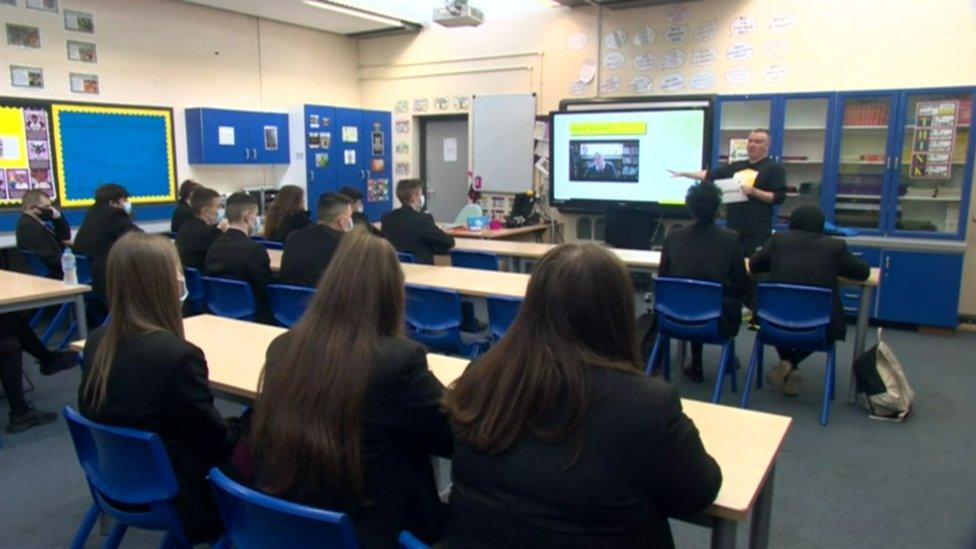
Dundonald High School is one of the first to use a new education programme on gambling
Dundonald High School, on the outskirts of east Belfast, is one of the first schools to make use of the new education programme.
Barry Fennell, from Gambling With Lives in Northern Ireland, delivers the course of five lessons to a class of 15 and 16-year-olds.
The course features a particularly hard-hitting film.
It tells the story of a young man who starts to gamble on arcade machines - as Lewis Keogh did.
The film shows how the teenager becomes addicted and tries to cover up what is happening to him, as his mental health worsens.
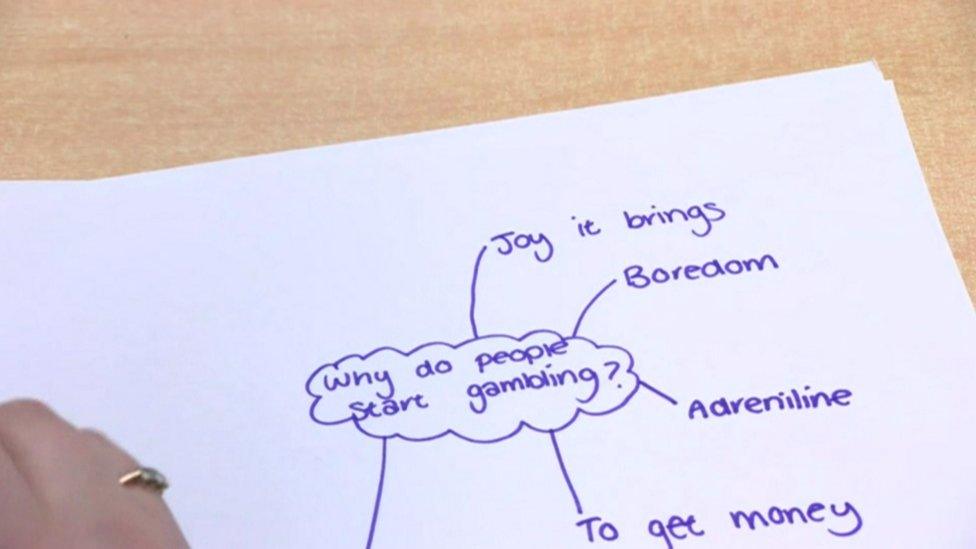
The class are invited to discuss why people start gambling
The education programme also looks at marketing techniques used by betting firms.
Gambling With Lives is campaigning for tighter laws on gambling advertising, particularly in relation to televised sports events.
Members of the class think the lessons are valuable.
"Everywhere you look, gambling's there - it's on your phones, it's on billboards - and that's what attracts people, and draws them in," said Gabby.
James added: "I wasn't really sure about how addictive gambling can be. But I know now."
Ellie hopes that "in the future, if I know someone who's going through this, I'll be able to help them".
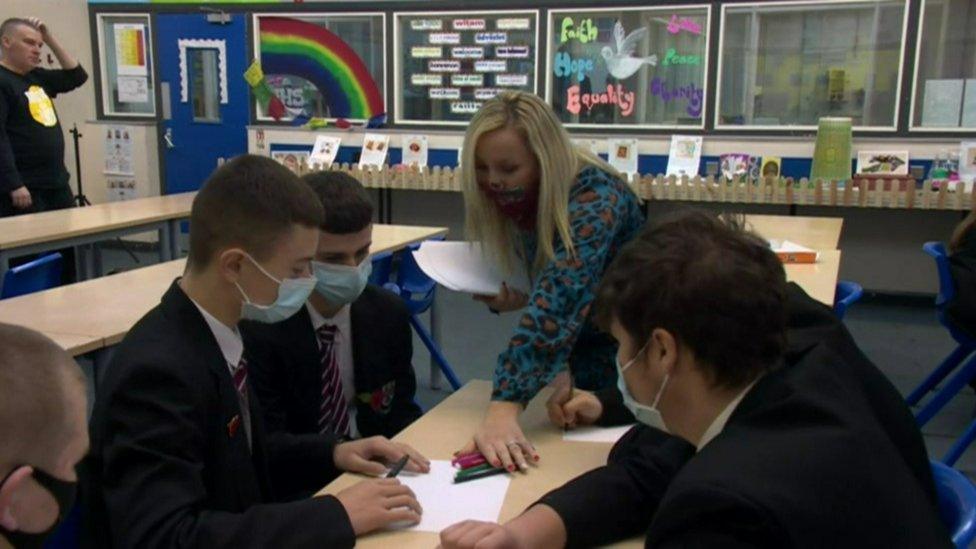
Teacher Laura Haggan says gambling has become more accessible
Teacher Laura Haggan said that "gambling addiction is definitely going to have to be more at the forefront" of the curriculum.
"Most of the students were aware of gambling, but not the extent of the harm it can cause," she said.
According to research carried out by the Gambling Commission in 2016, about 340,000 adults in England, Scotland and Wales are thought to be "problem gamblers", which is defined as "gambling to a degree which compromises, disrupts or damages family, personal or recreational pursuits".
It is also estimated that 55,000 young people aged 11-16 in the UK have a harmful gambling habit.

Around 340,000 adults in England, Scotland and Wales are thought to be "problem gamblers."
The Betting and Gaming Council (BGC), which represents gambling companies, said its members are "at the forefront of efforts" to tackle problem gambling and protect young people.
The group said: "In April 2020, we launched the £10m Young People's Gambling Harm Reduction programme, an independently delivered and evidence-led education, training and support programme for 11 to 19-year-olds.
"It is being delivered to pupils across Great Britain and Northern Ireland by leading charities GamCare and YGAM.
"According to the Gambling Commission, the proportion of young people taking part in any form of gambling has fallen from 23% in 2011 to 11% in 2019.
The BGC said the main forms of gambling young people take part in a "playing cards, private bets with friends, scratchcards and fruit machines".
"All types of gambling that are not offered by BGC members," it said.
"In addition to funding education support, the BGC has worked with online platforms to introduce new safeguards."
The BGC added that keeping young people said was "a key priority" and said it was "committed to doing more in 2022".
Policymakers and academics have pointed out that more research is needed on gambling addiction, and figures can sometimes be disputed.
But the existing data strongly indicates that the issue is particularly common in Northern Ireland.
The 2016 Gambling Prevalence Survey, commissioned by the devolved government at Stormont, suggested 2.3% of adults in Northern Ireland were classified as "problem gamblers".
That is four times the rate across the rest of the UK.
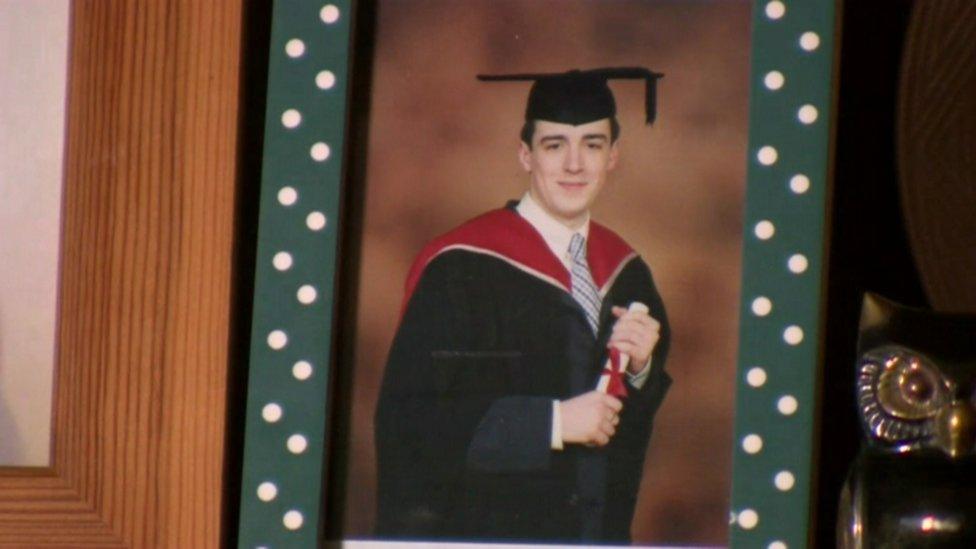
Lewis's parents have vowed to end the stigma around gambling addiction
Pete Keogh believes it may have something to do with a sense of shame.
"There seems to be a reticence in our society here for people to come forward and talk about it," he added.
The current law in Northern Ireland has been in force since 1985.
In the rest of the UK, the key piece of legislation is the Gambling Act 2005 - which is presently being reviewed by the Westminster government.
A new bill is going through the Northern Ireland Assembly, which aims to update the legal framework.
The Betting, Gaming, Lotteries and Amusements Bill would allow ministers to impose a financial levy on businesses who apply for a gambling licence, which would go towards projects designed to help addicts.
It would create new offences in relation to inviting or allowing people under 18 to play gaming machines.
The legislation would also allow bookmakers' shops in Northern Ireland to open on a Sunday, bringing the law into line with the rest of the UK and the Republic of Ireland.
Stormont's Department for Communities envisages the bill as the first of two stages of reform.
The legislation does not, for example, feature a proposal for an industry regulator - such as the Gambling Commission in England, Scotland and Wales - or significant proposals relating to online gambling.
However, the second phase - which will begin after the Assembly election in May 2022 - may address these issues.
Gambling With Lives said that it believed there could be as many as 650 suicides related to gambling in the UK each year.
Sadie Keogh said: "Before Lewis died, we didn't know about all this - and now we're going to ensure that everybody does."
Related topics
- Published27 May 2021

- Published25 November 2021
